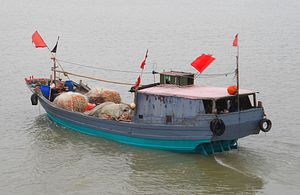The Indonesian Navy intercepted a Chinese vessel that was caught illegally fishing in Indonesian territory off the Natuna Islands on Saturday, June 18. Indonesian Navy spokesman First Admiral Edi Sucipto said the seven crew members of the Chinese vessel were detained. This is the third incident in the Natuna Islands involving Chinese vessels.
A statement from the Chinese Foreign Ministry confirmed that the Indonesian navy had fired warning shots at a Chinese vessel, injuring one Chinese fisherman and damaging the boat. However, China emphasized that the waters in question are regarded as “China’s traditional fishing grounds,” and accused Indonesia of an “abused of force.”
For its part, Indonesia has said it will continue to take “decisive” action against foreign ships operating illegally in its waters after the comments from Beijing. “We will not hesitate to take decisive action against foreign ships, whatever their flag and nationality, when they commit violations in Indonesian territory,” Sucipto said.
This is not the first time China has infringed on a foreign exclusive economic zone (EEZ). Chinese fishing vessels have in recent years made some very audacious incursion into foreign EEZs. In part, this has been due to the Chinese government asserting its ambiguous nine-dash line claim in the South China Sea. But incursions have also happened farther afield too.
In May, South Africa detained three Chinese ships and approximately 100 crew members on suspicion of illegal squid fishing in its EEZ without permits. The three vessels — Fu Yuan Yu 7880, Fu Yang Yu 7881, and Run Da 617 — had a combined total of almost 600 tonnes of squid when the navy escorted them to shore, according to Reuters.
“We cannot tolerate the plundering of our marine resources, which are a source of food security,” Agriculture and Fisheries Minister Senzeni Zokwana said in a statement. “We are also looking into the sudden influx of these vessels in our waters.”
The three vessels, part of a fleet of six 55-meter ocean-going fishing vessels officially registered in Fuzhou, have been caught red handed in foreign waters without licenses before. In January, the NGO Sea Shepherd encountered the fleet in the Indian Ocean, west of Perth in Western Australia. These vessels, as logged and reported by Sea Shepherd, were using driftnets, which have been banned by the UN since 1992 and are known to kill marine life indiscriminately. The Sea Shepherd gave pursuit and followed the fleet for two months into the South China Sea. On March 23, just north of the disputed Spratly Islands, Fu Yuan Yu 076 requested protection from a patrolling Chinese warship.
“We were called by Chinese Naval warship 571 and asked to explain our activities,” says Captain of the Steve Irwin, Siddharth Chakravarty. Surprisingly, the PLA Navy allowed the Steve Irwin to continue its pursuit.
In March, Argentina’s coast guard sank a Chinese trawler illegally fishing in Argentinian waters after the Chinese vessel attempted to ram the coast guard boat. Earlier this month, South Korea and the UN Command in Korea began a joint operation specifically targeting Chinese fishing vessels operating illegally off the west coast of South Korea. Tensions have been high since the 2011 murder of a South Korean coast guard officer by the Chinese crew of an illegal fishing vessel.
China is, by far, the world’s largest “producer” of fish. The term “producer” reflects the reported number of tonnes of marine fish captured. In the Food and Agriculture Organization of the United Nations’ 2014 “World Review of Fisheries and Aquaculture,” China recorded 13.9 million tonnes of marine fish; its closest competitor was Indonesia at 5.4 million tonnes. It is unclear if illegal hauls are included in these figures. Globally, illegal fishing costs the global industry around $23 billion each year.
In his 2005 book China and International Fisheries Law and Policy, Xue Guifang said three factors contribute to low compliance with international fishing agreements by Chinese fishermen. Many do not comprehend the changes to fishing waters stipulated in these agreements, meaning fishermen are now restricted from areas where they were previously able to fish without hassle. Another factor might be the poor technology many of the fishing boats carry, which do not properly identify their exact coordinates. However, the vast majority of infractions are driven by the economic incentives for illegally entering extraterritorial seas. Lastly, Xue says Chinese fisheries officials fall far short in the experience, capability, and determination needed to police foreign EEZ regimes.
Gary Stokes, director of Sea Shepherd Southeast Asia, is looking at the situation optimistically. Stokes told the South China Morning Post that there is a need to take a soft approach with China. In recent years, the Chinese government has appeared to be more proactive in the policing of illegal fishing. “Maybe China is taking this issue seriously, or at least they are following the law, which in itself is encouraging,” said Stokes.
































